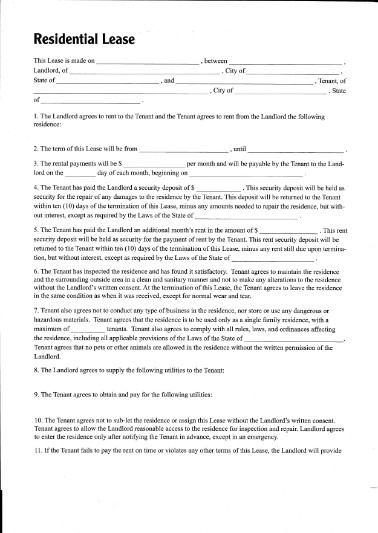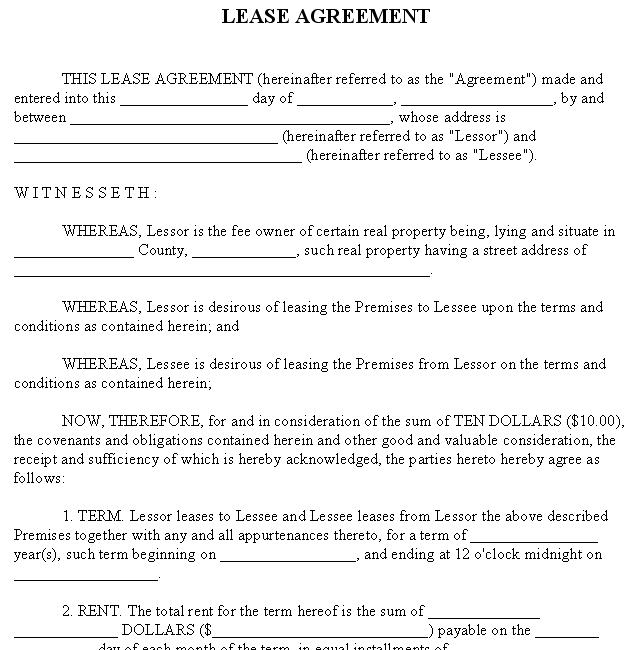Residential lease Agreement A lease is a contract calling for the lessee (user) to pay the lessor (owner) for use of an asset. A rental agreement is a lease in which the asset is tangible property. Leases for intangible property could include use of a computer program (similar to a license, but with different provisions), or use of a radio frequency (such as a contract with a cell-phone provider). A gross lease is when the tenant pays a flat rental amount and the landlord pays for all property charges regularly incurred by the ownership from lawnmowers and washing machines to handbags and jewelry. A cancelable lease is a lease that may be terminated solely by the lessee or solely by the lessor. A non-cancelable lease is a lease that cannot be so terminated. In common parlance, “lease” may connote a non-cancelable lease, whereas “rental agreement” may connote a cancelable lease. The lease will either provide specific provisions regarding the responsibilities and rights of the lessee and lessor, or there will be automatic provisions as a result of local law. In general, by paying the negotiated fee to the lessor, the lessee (also called a tenant) has possession and use (the rental) of the leased property to the exclusion of the lessor and all others except with the invitation of the tenant. The most common form of real property lease is a residential rental agreement between landlord and tenant.The relationship between the tenant and the landlord is called a tenancy, and the right to possession by the tenant is sometimes called a leasehold interest. A lease can be for a fixed period of time (called the term of the lease) but (depending on the terms of the lease) may be terminated sooner. A lease should be contrasted to a license, which may entitle a person (called a licensee) to use property, but which is subject to termination at the will of the owner of the property (called the licensor). An example of a licensor/licensee relationship is a parking lot owner and a person who parks a vehicle in the parking lot. A license may be seen in the form of a ticket to a baseball game. The difference would be that if possession is subject to ongoing, recurrent payments and is generally not subject to termination except for misconduct or nonpayment, it is a lease; if it's a one-time entrance onto someone else's property, it's probably a license. The seminal difference between a lease and a license is that a lease generally provides for regular periodic payments during its term and a specific ending date. If a contract has no ending date then it may be in the form of a perpetual license and still not be a lease. Under normal circumstances, owners of property are at liberty to do what they want with their property (for a lawful purpose), including dealing with it or handing over possession of the property to a tenant for a limited period of time. If an owner has surrendered possession to another (i.e., the tenant) then any interference with the quiet enjoyment of the property by the tenant in lawful possession is itself unlawful. Similar principles apply to real property as well as to personal property, though the terminology would be different. Similar principles apply to sub-leasing, that is the leasing by a tenant in possession to a sub-tenant. The right to sub-lease can be expressly prohibited by the main lease, sometimes referred to as a "master lease". For More Info Please Visit :- Residential Lease Agreement How to Create a Residential Lease Agreement You must follow proper protocol when deciding to rent out your home to another person. One essential step in the process is drafting a Residential Lease Agreement between you (landlord) and the renter (tenant). This ensures that both parties enter into the contract with an understanding of what is expected during the term of the lease. Generally, leases can last one year, a couple of months or even shorter periods of time. Written leases are especially important if a tenant damages the residence or fails to pay rent. A written document of your agreement with a tenant protects your rights as a landlord and strengthens your case if you end up in court. |
SITE:- http://www.doczap.net/   |
|